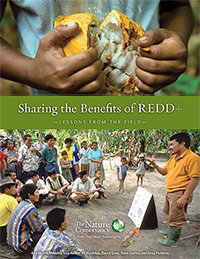
How can investments in REDD+ benefit people now?
How can tropical forest countries meet dual goals of conserving forests and increasing economic development?
What can we learn from other natural resource management and benefit sharing mechanisms?
In the near-term, most funding for REDD+ will come from the public sector and
will focus on building readiness, piloting key policies and measures, and
demonstrating how REDD+ will work on the ground. These upfront investments in
REDD+ can deliver real, meaningful benefits, such as securing stakeholders’
access to resources and land, empowering communities to participate in land-use
decisions, creating new “green” enterprises that are economically sustainable,
and shifting towards low-carbon practices in existing industries. These
benefits are real and measurable, and are independent from any
performance-based payments from measuring emissions reductions that may come
once a program is fully implemented. This report examines the full set of
opportunities to generate benefits through all phases of developing,
demonstrating and implementing a REDD+ program. Further, it examines how
actors’ interests at all levels can be aligned – from individual landholders to
private firms to state and federal governments.
This report includes case studies of 10 existing natural resource management
and benefit sharing programs. We identified the 5 key factors that must be
considered when designing any successful natural resource management program
and drew lessons for REDD+. The case studies focus on the following programs:
- Costa Rica’s National Payments for Environmental Services Program (PSA)
- Mexico’s Nature Conservation Fund (FMCN)
- Brazil’s Ecological Tax (ICMS-E)
- Indonesia’s Kecamatan Development Project (KDP)
- Botswana’s Multi-Year Approach to Budgeting
Diamond Extraction Revenues
- Brazil’s Amazon Fund
- Oddar Meanchey: Community Forest REDD+ Project
in Northwest Cambodia
- Distribution of Mineral Revenues in Colombia
- China’s Clean Development Mechanism Guangxi
Reforestation Project
- Bolsa Floresta: Amazonas State, Brazil
Contact info
Erin Myers Madeira
Global Climate Change Team
The Nature Conservancy
4245 N. Fairfax Drive, Suite 100
Arlington, VA 22203
emadeira@tnc.org